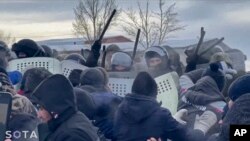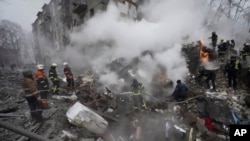The four-year sentence Russia handed down Thursday to Igor Girkin, a former Federal Security Service officer and military blogger, is part of a broader crackdown on critics of the Kremlin and its invasion of Ukraine, according to the British Defense Ministry’s daily intelligence report on Russia’s invasion of Ukraine.
The crackdown also reflects “the more authoritarian nature of life” in President Vladimir Putin’s Russia, the British ministry said on Friday.
The report said that Girkin had fought for the separatist forces in Donetsk in 2014, served as the defense minister in the self-proclaimed Donetsk People’s Republic for a brief period and blogged in support of Russia’s invasion of Ukraine.
In 2022, Girkin became highly critical of Russian leadership and its management for what he saw as its failure to pursue the “special military operation” in Ukraine effectively enough.
He was arrested in 2023 after the brief mutiny of Yevgeny Prigozhin, co-founder of the mercenary Wagner Group. In November, Girkin said he would run in the 2024 Russian presidential election.
After the Prigozhin mutiny, the British report said, it is highly likely that the Kremlin became sensitive to any criticism about Ukraine “from hard-line nationalists” because they are one of the “credible alternatives” to Putin’s leadership.
Security Council meets
On Thursday the U.N. Security Council met at Russia request in an emergency meeting, following the crash Wednesday of a Russian military transport plane near the Russia-Ukraine border. Both sides are calling for an investigation.
U.N. political chief Rosemary DiCarlo said the organization is not in a position to verify the circumstances of the crash.
“What is clear is that the incident took place in the context of Russia’s invasion of
Ukraine and ongoing war,” she said. “To avoid further escalation, we urge all concerned to refrain from actions, rhetoric or allegations that could further fuel the already dangerous conflict.”
Moscow has accused Kyiv of shooting down the plane that crashed Wednesday in the Belgorod region. Russia said the plane was carrying 74 people, including 65 Ukrainian prisoners of war who were to be part of a prisoner swap.
“The Ukrainian prisoners of war were transported to the Belgorod region in order to conduct yet another swap that was agreed between Moscow and Kyiv,” Foreign Minister Sergey Lavrov said Wednesday in New York where he was attending U.N. meetings.
“Instead of this, the Ukrainian side launched an air defense missile from the Kharkiv region. It targeted the airplane and was a fatal strike.”
Ukrainian President Volodymyr Zelenskyy said his government is insisting on an international investigation to establish the facts.
At the Security Council, a Ukrainian envoy repeated her government’s call for an international investigation, saying since the plane went down in Russian territory, they did not have access to it.
“Following the plane crash, the Federal Security Service and the Russian military did not allow emergency workers to inspect the crash site as per protocol,” Deputy U.N. Ambassador Khrystyna Hayovyshyn said. “According to our military intelligence, only five bodies were sent to the local morgue in Belgorod, and no human remains are visible on videos from the crash site.”
Russia’s deputy envoy, Dmitry Polyanskiy, disputed that, calling it “paranoid nonsense.”
Several council members warned against speculation and accusations without critical facts yet established.
Video of Wednesday’s plane crash posted on social media showed a plane falling from the sky on its side before exploding into a massive fireball as it hit the ground in Russia’s snowy, rural, western Belgorod region.
Kharkiv borders Belgorod, which is Russian territory. The two sides have carried out numerous prisoner swaps since Russia invaded Ukraine nearly two years ago.
Nuclear concerns
The head of the International Atomic Energy Agency briefed the council earlier Thursday on the situation at the Zaporizhzhia nuclear plant in Ukraine.
Rafael Grossi told reporters after the private meeting that he would be returning to Ukraine in the next 10 days and would then travel to Moscow.
The nuclear plant, which is in occupied Russian territory, recently lost external power for an eighth time. It has also frequently been in the crosshairs of fighting, leading to fears of a nuclear accident.
Asked by a reporter how dangerous the situation at Zaporizhzhia is on a scale of 1 to 10, with 10 being the most dangerous, the IAEA chief said it varies.
“I think that there are days where you are near 10, and there are days that nothing seems to happen,” Grossi said. “The problem is this — the complete uncertainty, because this is a war.”
VOA U.N. correspondent Margaret Besheer contributed to this report. Some material for this report was provided by The Associated Press, Agence France-Presse and Reuters.







